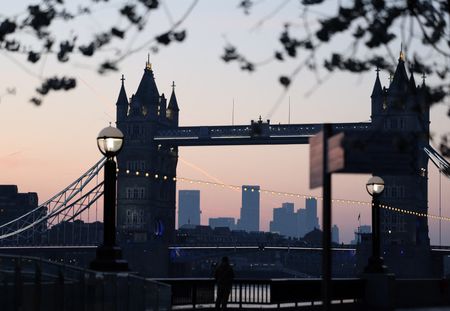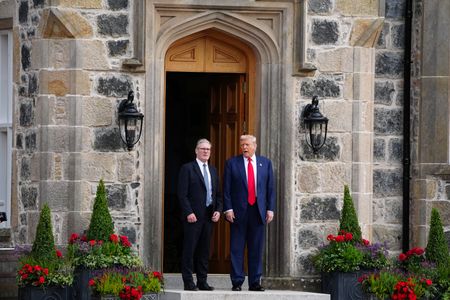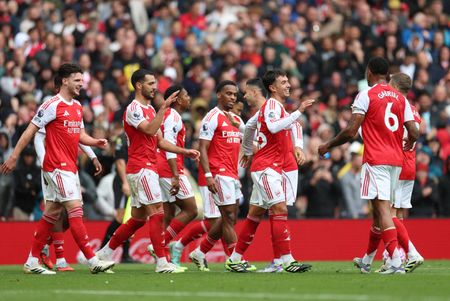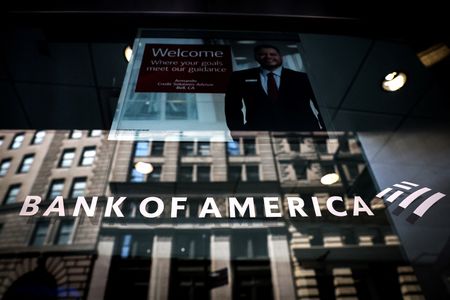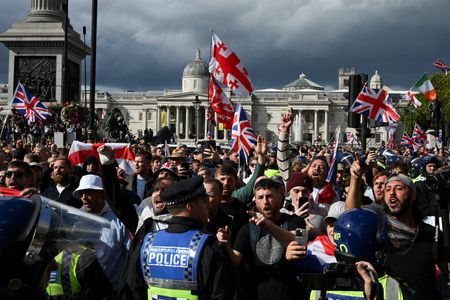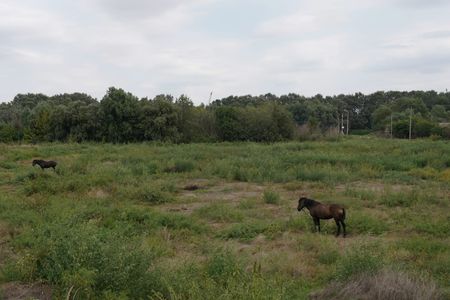By Anant Chandak and Shaloo Shrivastava
BENGALURU (Reuters) – Global trade tensions sparked by U.S. President Donald Trump’s tariffs have hurt UK business sentiment and will slow economic growth, according to a Reuters poll of economists who stuck to expectations for one Bank of England interest rate cut per quarter.
U.S. tariffs have negatively impacted business sentiment in the UK, according to all 25 respondents in an April 16-23 poll who answered an additional question, including one who said very negative.
The survey was conducted after Trump announced a 90-day pause on his much larger than expected tariffs on major trading partners around the world except for China, which he has ramped up levies on. The UK was hit by the lowest tariff, at 10%.
More than 40% of common contributors who participated in the April and March polls, 20 of 45, cut their growth forecasts, with the median at 0.9% versus 1.0%, down for a fourth straight month.
More than two-thirds reduced their UK growth forecast for next year, now a median 1.2% versus 1.4% in March.
“We expect tariff-induced shocks to business investment will echo that of Brexit,” said Gabriella Willis, UK economist at Santander CIB, referring to Britain’s recent exit from the European Union.
“Many businesses were already in wait-and-see mode ahead of the April rise in the NICs (National Insurance Contributions) employer payroll cost, but the advent of tariffs and the uncertainty they bring will cement this caution.”
British private-sector activity weakened by the most in more than two years in April, a separate business survey showed on Wednesday.
The International Monetary Fund on Tuesday downgraded its 2025 UK growth forecast to 1.1% from 1.6% in January, matching their overall downgrade for advanced economies.
“At the moment we have a very modest (U.S. tariff) impact on UK GDP,” said Sanjay Raja, chief UK economist at Deutsche Bank. “We are expecting to see the indirect effects of trade shocks coming through via lower business investment.”
For now, economists appear sanguine about inflation.
Poll medians showed a peak at 3.3% next quarter, lower than the BoE’s 3.7% forecast made in February for the same period.
Inflation was expected to average 3.1% in 2025 and 2.3% in 2026, largely unchanged from the March survey.
On Tuesday BoE Monetary Policy Committee member Megan Greene said the risk from tariffs was “disinflationary” rather than inflationary, allowing a “cautious” approach to rate cuts.
The broadly cautious outlook for UK rates has not changed since last month and has been roughly steady since September.
The BoE, which has cut Bank Rate by 75 basis points to 4.50% since kicking off its easing cycle in August, is expected to cut 25 bps each quarter, ending the year at 3.75%.
Interest rate futures are pricing in around 100 bps more in reductions this year.
(Other stories from the Reuters global economic poll)
(Reporting by Shaloo Shrivastava and Anant Chandak; Polling by Indradip Ghosh and Renusri K; Editing by Ross Finley and Hugh Lawson)

